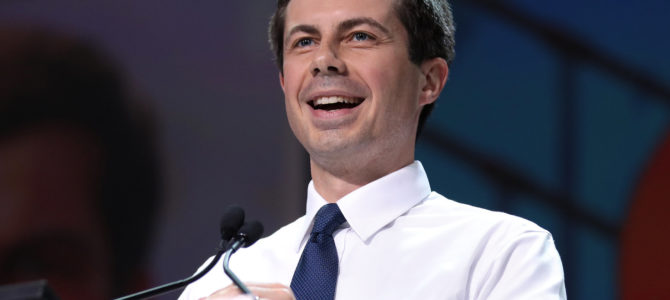
As the United States careens off the economic tracks towards stagflation, the Biden administration and Democrats in Congress continue to posit that their proposed massive spending bill will counterintuitively decrease rates of inflation.
This was the argument recently articulated by Secretary of Transportation Pete Buttigieg during his conversation with Chris Wallace on the most recent “Fox News Sunday.”
After Buttigieg praised the “historic” plan’s focus on providing “action on climate before its too late” and massive increased spending on “finally [getting] preschool for every child in this country” and “making childcare affordable for every family,” Wallace pressed Buttigieg on “the issues Americans care about the most,” including inflation.
Gas prices have jumped from an average of $2.14 a year ago to $3.41 today. The price of natural gas, essential to heating U.S. homes, has doubled since June to more than $6. Coal will subsequently generate nearly a quarter of U.S. electricity this year. Use of the much dirtier, higher carbon-emitting fuel has already grown by 22 percent in 2021. This latter issue was not brought up when Buttigieg referenced the “transformational” bill’s focus on climate challenges.
To Wallace’s statement that consumer prices have risen at their highest rate in 30 years, Buttigieg’s answer was simple: the economic package’s massive spending hike will actually provide the tools for fighting future inflation.
The Real Causes of Inflation
“The reason [for our current levels] of inflation is we have a drag on our economy in labor supply, because a lot of parents aren’t going back to work because they can’t find childcare,” Buttigieg said. This does not correspond to the reality of a historic level of unfilled jobs currently available in the United States. While lack of childcare is a factor, so are government stimulus payments during the pandemic, expanded access to unemployment benefits, a freeze on student loan payments, a moratorium on evictions, and overall decreased demand resulting in increases to personal savings.
This type of unemployment should naturally decrease as the amount of accumulated personal savings shifts towards consumption, corresponding to the requisite increase in demand that we are seeing as society emerges from the pandemic. Increased inflation should naturally lead to decreasing unemployment – if we simply let the economic forces play out.
Instead, massive government spending on the level proposed by the current infrastructure bill is sure to further threaten the economic stability of the country. Buttigieg claims the current levels of inflation are transitory and will be offset by the bill’s ability to make the U.S. economy more competitive through infrastructure investment, and — again – its focus on childcare policy. These are long-term solutions — Buttigieg admits as much — but the Transportation secretary proposes little to account for the immediate inflationary impact that is sure to result from the trillion-dollar proposal.
“Sticky wages” mean U.S. incomes will not rise as fast as the inevitable price hikes that the infrastructure bill will create. There will also be additional inflationary pressures as businesses attempt to keep up and boost wages to attract new workers and keep current ones. The increase in labor costs and increasing demand will cause much higher prices in service-related industries.
More Denial of Reality with Port Congestion
Buttigieg was then pressed on the impact of supply chain back-ups and the degenerating situation at U.S. ports, even in light of President Biden’s orders for the latter to maintain 24/7 operational hours. Wallace brought up one instance in which a terminal beach in Los Angeles announced 2,000 appointments for truckers that were unused. Additionally, Goldman Sachs says that port congestion is going to be a painful fact of life for at least another year.
Buttigieg proposed no specific solutions to these issues, and instead harkened back to port congestion and supply chain problems as simply being inherent to the nature of the pandemic. He did, however, pointedly add a remark about the president’s decisive leadership and the drive “to get everyone vaccinated.”
Higher Taxes and Gas Prices
As to the gas prices? Besides President Biden’s recent insisting that the Organization of the Petroleum Exporting Countries boost production — a slap in the face to the men and women who innovated, invented, and worked to make this country energy-independent in 2019 for the first time in over a half-century — Buttigieg had a more creative answer.
He suggested government-subsidized electric cars: “Think about what it would mean to American families to get that discount of up to $12,500 so that you could buy one of these electric vehicles and never have to worry about gas prices again.”
The common thread to all of the Transportation secretary’s proposed solutions: unprecedented levels of increased spending. While the conversation doesn’t touch on the specifics of where the funding for the latter will come from, it is presumably tied back to the Democrat battle cry to “tax the rich.” The infrastucture bill does include a provision for an additional 5 percent surtax on adjusted gross income between $10 million and $25 million, as well an additional 3 percentage points on income in excess of $25 million.
This, however, according to the White House’s own estimates, would only raise $230 billion over 10 years. In reality, and contrary to the claims of its proponents, the bill will eventually require tax hikes for the American middle class as well. Unfortunately, it will also be financed by massive levels of foreign borrowing.
Back in 1964, in his famous “A Time for Choosing” speech, Ronald Reagan lambasted then-President Lyndon B. Johnson’s “Great Society” initiative, predicated on a massive expansion of the federal government’s size and spending. Reagan presciently railed against the reduction in purchasing power that would inevitably result from the planned inflationary pressures embedded in Johnson’s policy. It’s no fluke of history that Reagan won the U.S. presidency 16 years later as the country was reeling from the ensuing economic turmoil that Reagan foretold.
Hopefully, it won’t take another 16 years of financial upheaval before a new champion of Constitution-based governance emerges.









